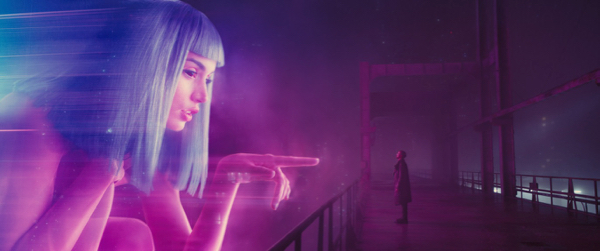Movie review by Greg Carlson
As thrilling and thought-provoking a sequel as one might hope, “Blade Runner 2049” leverages potent nostalgia for one of the most influential science-fiction films in the canon. It’s a tall order to measure up to Ridley Scott’s stunning 1982 accomplishment, and filmmaker Denis Villeneuve — working for the third time with cinematographer Roger Deakins — pays homage without succumbing to pure slavishness. While the new model contains enough echoes, parallels, and callbacks to infuriate some members of the same crowd who carped about structural similarities between “The Force Awakens” and “Star Wars,” the pleasures and charms of metanarrative and intertext can enhance, rather than diminish, one’s enjoyment of the “original,” whatever that is today. There are, after all, some seven versions of the cyberpunk landmark.
Ryan Gosling, in taciturn “Drive” mode, is Blade Runner KD6.3-7 — K for short — a dutiful civil servant reporting to Robin Wright’s Lt. Joshi in the L.A.P.D. Sent to dispatch a replicant named Sapper Morton (Dave Bautista) in a scene that pays tribute to the tense interrogation of Brion James’ Leon Kowalski by Morgan Paull’s Dave Holden, K discovers an ossuary that sets into motion a plot that draws on one of the first film’s core questions: how do we define personhood? That mystery, pondered from multiple angles and through the carefully engineered eyes of several supporting characters, is just as loaded in 2017 as it was thirty-five years ago.
While the “more human than human” replicants continue to be produced as specimens of uncanny beauty and unfettered physical strength and stamina, their new “father” is Jared Leto’s Niander Wallace, a Croesus-rich shadow replacing Joe Turkel’s Eldon Tyrell. Leto, whose optical impairment and careful diction veer awfully close to an attempted imitation of the inimitable Turkel, is abetted by deadly femme fatale Luv (Sylvia Hoeks). Hoeks is cool, but she’ll never be as cool as the richly drawn and beautifully written likes of Rutger Hauer’s unforgettable Roy Batty. Who could?
The half-angels/half-devils that filled out Batty’s crew of kick-murderers, basic pleasure models, and cargo loaders gave “Blade Runner” urgency and pulse. They wanted more life, fucker. But accelerated decrepitude and Methuselah Syndrome are absent from “2049.” A different existential theme resides in Joi (Ana de Armas), the artificially intelligent companion of K. The novelty of the relationship between Joi and K, complicated by the presence of Mariette (Mackenzie Davis), calls to mind some aspects of the complex operating system in Spike Jonze’s “Her.”
Villeneuve’s “Blade Runner” is roughly 45-minutes longer than the first, and the extended running time of the sequel is not necessarily an asset. The much anticipated return of Harrison Ford to one of his signature roles is, along with another jaw-dropping surprise, deliberately postponed until later in the film. Curiously but not unexpectedly, the expository retrofitting that backfills Deckard’s biography doesn’t quite match the man we thought we knew. Even so, Deckard’s monkish existence in a space-age bachelor pad, complete with virtual Frank Sinatra, Elvis Presley, and Marilyn Monroe, sees Villeneuve confidently staking out a different vibe from the densely populated urban chaos of Scott’s Los Angeles.
